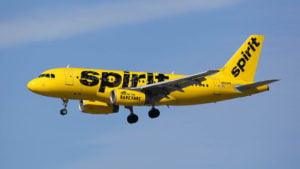By all accounts, airline stocks had a pretty bad 2020. The novel coronavirus pandemic hit every sector hard. But the airline industry suffered the most at the hands of the virus. There were already several companies with debt-laden balance sheets. And then demand started plummeting. It was a perfect storm that no one saw coming.
In response, airline companies did the only thing that they could do, raise money. Massive amounts of debt were piled on and shares issued, weakening the financials further. According to the International Air Transport Association (IATA), passenger air traffic saw a 66% year-on-year drop in 2020. Things are not looking up 2021 either, with forward bookings taking a nosedive in December.
Against this backdrop, it is surprising that any carrier is doing well. Although the U.S. government has come in and offered a lifeline through a $25 billion bailout, it has come at a cost. Carriers that have taken out loans under the program have to abide by certain rules, including a curb on sending employees home.
This list is a compilation of three airline stocks that have a particularly stressed outlook. Through no fault of their own, these companies will limp along until we see a broader recovery, not expected until 2024 at the earliest.
Airline Stocks: American Airlines (AAL)

If you consider several metrics, AAL is the largest airline in the world. Given its large fleet size and network, the company was bound to face issues when the virus struck in full force last year in March.
In response, the company did what it could. It raised large amounts of capital through a mix of equity and debt. Its balance sheet was already highly leveraged, with roughly $20.9 billion in long-term debt at the end of 2019.
However, the crisis has led to an excessive amount of debt and capital raises for AAL, and the momentum is not stopping. In a recent filing, the carrier said it was looking to raise the sale of another $1 billion in stock, with the option to sell up to $1.12 billion.
Last October, the embattled carrier sold $882.4 million worth of stock under a $1 billion stock sale program.
Although things are bleak at this point, there are some silver linings. First, the company is doing well in terms of cutting costs and streamlining its network. Quarterly results are also good. The company reported earnings beats to the tune of 6.2% and 5.7% in the past two quarters, as per Refinitiv data.
And finally, AAL stock is up almost 20% in a month. You can chalk that up to the popular WallStreetBets Reddit forum. These investors infamously squeezed hedge-fund managers out of GameStop (NYSE:GME) and are now looking for other highly shorted stocks. AAL is right up their alley.
According to the 17 analysts tracked by Refinitiv covering AAL stock, the 12-month price target stands at $13.40 per share, a 40.9% discount to the last close of $22.68 a pop on Wednesday. Airline stocks are risky in general, but AAL definitely takes the cake.
JetBlue Airways (JBLU)

Along with the rest of the sector, JBLU stock had a particularly rough 2020. Shares are still below their highs of $20 in February 2020. But the recent rally in JBLU stock is a heartening development. It comes on the heels of a better-than-expected fourth quarter that topped earnings and revenue estimates.
Although sales fell 67% year-over-year, it was still better than the 70% fall expected by the company. Revenues of $661 million beat expectations by $25.67 million, per the estimates, compiled by Seeking Alpha. Its EPS of -$1.53 also beat expectations by 13 cents, a 9.5% beat.
Most importantly, cash burn is significantly down from $18 million per day on average in mid-March to $6.7 million per day in Q4. With a cash balance of $3.1 billion, the company will not be facing any major liquidity issues.
However, all this has come at a cost. Long-term debt has ballooned to $4.139 billion in September 2020 from $1.253 billion in September 2019. Meanwhile, in Q4, the company netted over $700 million through an equity offering and sale-leaseback transactions. Hence, dilution is something that existing stockholders will have to live with.
For all these reasons, the analyst outlook for JBLU stock is not that great. Refinitiv tracks 18 analysts covering the carrier, out of which just six are bullish on its prospects, making it one of the riskier airline stocks out there.
Meanwhile, the average price target from 15 analysts covering is $16.40 per share, a 9.6% discount to the current price. Hopefully, greener pastures are ahead. American Airlines and JetBlue are partnering up, focusing on 33 new routes and 75 codeshares under their agreement. Nonetheless, the outlook remains stressed for both of these legacy carriers.
Spirit Airlines (SAVE)

Our next entry on this list is a particular favorite of mine. The chances are that if you have wanted to save some money on a trip, you have checked out this ultra-low-cost carrier. Spirit Airlines is active in the United States, the Caribbean and Latin America.
Year-to-date, returns are up 36%, and that isn’t surprising. Consumer discretionary incomes are down, and people hopeful for a recovery in the airline industry are betting on SAVE stock for one reason, it’s a low-cost carrier.
However, recent results do not bail it out, sadly. Seeking Alpha data shows that the company has reported negative earnings surprises three times in the last four quarters. In the last quarter, revenues came in at $498.5 million, a miss of $12.76 million. EPS of -$1.61 missed estimates by 13 cents.
Things are not looking up for the carrier in 2021 either. By its own admission, stay-at-home requirements due to the virus’s resurgence will lead to a slowdown in the recovery. In the meantime, jet fuel prices will continue to rise as vaccines roll out throughout the world.
Refinitiv tracks 12 analysts with a price target on SAVE stock. The average 12-month price target stands at $30.10 per share, a 10% discount to the current price.
The only silver lining is that the company managed to cut down on its cash burn, which stands at $1.8 million in the fourth quarter. The company’s cash and short-term investments stood at roughly $1.90 billion for 2020.
On the date of publication, Faizan Farooque did not have (either directly or indirectly) any positions in the securities mentioned in this article.
Faizan Farooque is a contributing author for InvestorPlace.com and numerous other financial sites. Faizan has several years of experience in analyzing the stock market and was a former data journalist at S&P Global Market Intelligence. His passion is to help the average investor make more informed decisions regarding their portfolio.
